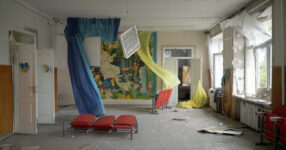
‘Intercepted’ Review: The Awful Intimacy of the War in Ukraine
The voices of the offscreen Russian soldiers and their acquaintances in the powerful Ukraine-set documentary “Intercepted” are matter-of-fact, swaggering and anguished. “I tell you, they live better than us here,” a soldier tells a woman back home. “Right, look how the West supports them,” she says.
Sometime later, another soldier explains to a different woman, “We were given the order to kill everyone we see” to protect Russia’s miliary positions. “I’m telling you, I’ve already seen a forest full of corpses, more than a cemetery.” He adds, “I said that I won’t kill anyone.”
Not long after Russia invaded Ukraine on Feb. 24, 2022, and Russian troops started flooding into the country, their communications began leaking out, at times with dire consequences. Ham-radio operators and open-source groups began capturing unencrypted battlefield radio transmissions among Russian forces on the ground. Ukraine also intercepted more prosaic phone calls that Russian soldiers made to their families and friends, to their wives and mothers and children. The soldiers talked about how they were doing, what they’d seen, what their orders were and even disclosed their locations; some spoke about whom they had killed.
You hear a number of these phone calls in “Intercepted,” which was directed by the Ukrainian-Canadian filmmaker Oksana Karpovych. In a director’s statement for the movie, Karpovych explains that she was working in Ukraine as a producer for the news network Al Jazeera when the invasion began. After the intercepted calls were publicly released, she and a crew of four — including her cinematographer, the British photographer Christopher Nunn — traveled across Ukraine gathering images of devastation, which she has juxtaposed with calls intercepted between March and November 2022. The result is a haunting, often jolting depiction of the profound toll that the war has exerted on soldiers and civilians alike.
“Intercepted” is at once subtle and blunt. It opens on three children — one on a swing — next to an otherwise empty country road that stretches down the middle of the shot. It’s an outwardly ordinary, pacific tableaux. There are chalk marks scrawled on the road, a couple of bikes resting on the grass and a woman lingering off to the side. The trees are lush and green, and there are no obvious signs of war. At one point, a car in the distance slowly crosses the road. Karpovych then cuts to a closer shot of the kids, which allows you to see their faces more fully; I think that she wants you to remember them as you watch.
That first country street leads to many more. The movie starts in the north and moves south and then west, a route that Karpovych has explained in interviews is meant to suggest the trajectory of the invasion. Using a mixture of vivid, precisely framed moving and still images, she takes you across the war-ravaged country. You travel down dirt and paved roads, some flanked by incinerated military vehicles, and into heavily bombed villages and cities. She also recurrently brings you into people’s homes, including some that look like they were hastily abandoned. In one, a carton of eggs still rests on a kitchen table amid a jumble of crockery, suggestive of an unfinished breakfast. In another house, a woman sweeps up shattered glass.
Karpovych uses the intercepted calls shrewdly, deploying them amid anxiety-building silences, washes of electronic music and more everyday sounds like birdsong that accentuate both the ordinariness and extraordinariness of what is unfolding onscreen. In one scene, a Russian man speaks to his mother over a traveling shot taken from high atop a tank. As they begin chatting, the tank speeds down a dirt road, its gun juddering along the edge of the shot. (Presumably the movie crew hitched a ride on a Ukrainian tank.) Their talk seems bland — the mother asks where her son is, he refuses to answer — but invokes deadly consequences because both Ukraine and Russia have used smartphone signals to home in on targets.
As the miles rack up, the Russian voices grow increasingly varied and disturbing. (Although there are Ukrainians throughout, you rarely hear them speak.) Some of the soldiers sound spookily calm while others seem deeply unsettled and sometimes flat-out despairing and desperate. Some speak jealously and bitterly, though almost admiringly, about Ukraine and how nice everything seems, a reminder that Russia has replenished its troops with conscripts from poor regions and from prisons, and has also signed up impoverished foreigners. In one of the more upsetting conversations, a Russian soldier tells a woman that his fellow troops shot a Ukrainian mother in front of her two children. “She counts, she’s also an enemy,” the woman replies, exposing the bleak, dehumanizing cost of war for all involved.
Elsewhere, though, the Russian women openly agonize over what they’re hearing, whimpering and at times going quiet. After a soldier explains how a prisoner was brutally murdered, a woman weakly responds, “I don’t even have anything to say.” The silences during some of these exchanges speak volumes in a movie that — as these private talks play over images of ruined lives — underscores the horrific intimacy of war. “Intercepted” is yet another crucial eyewitness document of the Russia-Ukraine war, one that makes the personal stakes painfully vivid. It’s a reminder that war isn’t waged by putative monsters but by monstrous human beings who sometimes need to hear the sounds of their mothers’ voices.
Intercepted
Not rated. Running time: 1 hour 35 minutes. In theaters.



